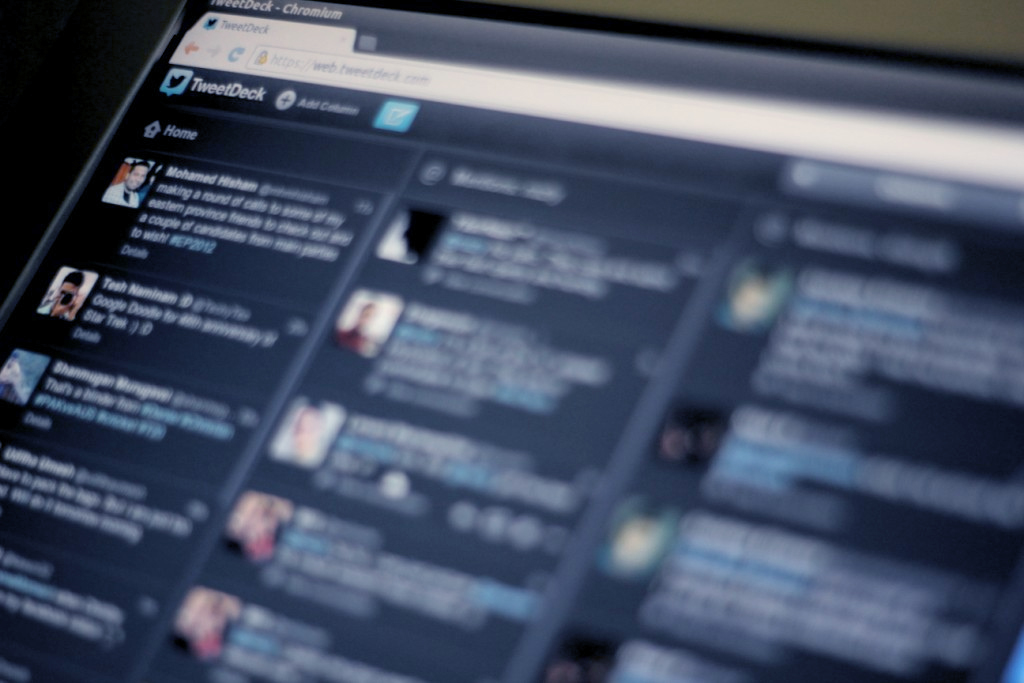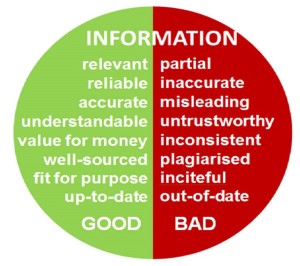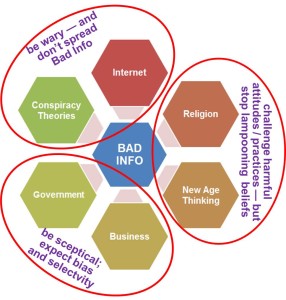Mike Flood asks how much is the Information Age being tainted and diminished by disinformation.

The Internet is full of information, coming at you thick and fast. But how does one separate the wheat from the chaff? Photo: Nazly Ahmed
The Internet Society once observed that the Internet is ‘proving to be one of the most powerful amplifiers of speech ever invented. It offers a global megaphone for voices that might otherwise be heard only feebly, if at all. It invites and facilitates multiple points of view and dialogue in ways unimaginable by traditional, one way mass media.’ The Internet is this and much more besides.
But as we become increasingly dependent on this miracle of human ingenuity, we are also having to cope with the internet’s darker side – bad information, propaganda, cybercrime and pornography. Here are two less flattering descriptions: ‘an electronic asylum filled with babbling loonies’ (Mike Royko) and ‘the biggest lavatory wall in history’ (AC Grayling).
We might live in an ‘Information Age’, but how much is it being tainted and diminished by disinformation? We are accustomed to tyrants, dictators and jihadists putting out their warped propaganda and fabrications. But there are a host of other more subtle sources of bad information that we are exposed to 24-7 and this raises questions about the impact this may be having on personal wellbeing, social cohesion and international relations.
1 Amplifier of speech… or lavatory wall?
 Online social networking services like Facebook, video sharing websites like YouTube, and open source blogging sites like WordPress enable anybody with a computer and a modicum of nous to disseminate information instantaneously to a global audience. And if people pass the information on, and it is sufficiently interesting or scurrilous, it may go viral and reach millions. But most of the information posted online has not been edited or peer reviewed and therein lies a problem because it can be partial or inaccurate, or just plain wrong. Whether this is by design (i.e. disinformation) or not (misinformation) is beside the point; in any case the distinction is often blurred by spin.
Online social networking services like Facebook, video sharing websites like YouTube, and open source blogging sites like WordPress enable anybody with a computer and a modicum of nous to disseminate information instantaneously to a global audience. And if people pass the information on, and it is sufficiently interesting or scurrilous, it may go viral and reach millions. But most of the information posted online has not been edited or peer reviewed and therein lies a problem because it can be partial or inaccurate, or just plain wrong. Whether this is by design (i.e. disinformation) or not (misinformation) is beside the point; in any case the distinction is often blurred by spin.
In 2010, Dow Jones carried out a survey of ‘Bad Info’ on the free web. This identified ‘opinion disguised as fact’ and ‘biased sources’ as the most frequently cited types of bad information. People use weasel words (‘many experts agree…’), selective omission, imply without saying, bury inconvenient facts, include misleading statistics or images, and so on… More than a third of respondents indicated that they encountered bad information ‘often’ or ‘constantly’. The most affected sectors were businesspeople, students, and inexperienced researchers.
There are websites that specialise in racist, xenophobic or indecent material, but bad information is also found on websites like Wikipedia, which were set up for the best of reasons and in the public good. Friends and rivals are constantly trying to manipulate content – be it the biography of controversial leaders or celebrities, information about a commercial product (pro or anti), anything about Israel, etc. The intention may be to manage reputation, promote some interest or other, affect page rank/link traffic, or simply to cause harm. It is difficult for any of us to know the extent of ‘Wikihacking’.
Another concern is how far search engines give a balanced view of what’s available on line. Who sets the algorithms? Things may change for the better as the programming gets even more sophisticated – or they may get worse, if commercial interests have their way. Google has already announced that websites that are not mobile-friendly will be pushed down the rankings, and there is talk of it launching an initiative to reduce bad information with a program which ranks websites according to veracity using a ‘knowledge-based trust’ scoring system that checks website data against verified facts in a ‘knowledge vault’. This should penalise web pages containing suspect or contradictory information.
The internet is censored to protect intellectual property and discourage defamation, harassment and obscene material, but this is but a drop in the ocean when it comes to removing bad information. So whilst the internet provides unrivalled access to information, those who surf its often murky waters have to be extremely careful. Things may not be all they seem.
2 Other sources of bad information
But bedroom bloggers, pranksters, and mischief-makers are not the only source of bad information. We also have the outpourings of religious zealots, New Age thinkers, unprincipled corporations, government spin doctors, and conspiracy theorists. This has always been the case but the issue is made more problematic and challenging by the Internet and the relative ease with which such material can now be accessed and used.
- Mainstream religions and cults are major sources of ‘myth-information’ and promulgate misinformation by definition – they can’t all be right, although they can all be wrong, as atheists like to point out. How many religions put out disinformation is an interesting question: some tele-evangelists clearly do; and lying to non-believers (taqiyya) is permissible in Islam.
- Proponents of woo, including New Age thinking, alternative therapies, and all manner of snake oil also propagate bad information and make claims that are unscientific, unproven, or unprovable. Whether astrology, biorhythms, esoteric healing, extrasensory perception, homeopathy, reflexology etc. work is debatable, but some may on occasion through the power of suggestion (the placebo or nocebo effect).
- Big businesses do too. Big corporations are regularly accused of spreading disinformation. The criticism is most intense with high profile industries that promote controversial technologies – GMOs, nuclear power, waste incineration, fracking and the like. But naysayers are also prone to use propaganda and selectively interpret facts, and this just adds to the confusion.
- The media is also culpable. Tabloid newspapers and news corporations are regularly accused of distorting or sensationalising issues – the former by making up stories; the latter when, for fear of being scooped, they broadcast without adequate scrutiny. (Cf. The new phenomenon of fact- and rumour-checking websites, and the extension of the idea to the media are good developments.)
- Governments and state agencies regularly disseminate questionable material, often with a good dose of ‘spin’, and they are not averse to using negative advertising to attack opponents’ record, policies or personalities. This muddies the water. Some governments go further and suppress historical facts, even making it illegal to challenge the official line. Turkey’s denial of the Armenian Genocide of 1915 is but one of many examples.
- Conspiracy theories can be set in train by any of the above; they flourish on the internet and in some parts of the media. Sadly, they are widely believed in many parts of the world so have political currency. This is especially so where governments are economical with the truth and suppress bad or inconvenient news.
3 Costs and consequences
So what impact does exposure to bad information have on public attitudes, behaviour and wellbeing? And do we ourselves actively make the situation worse by ‘confirmation bias’, our tendency to search for, interpret or recall information in a way that confirms our beliefs or prejudices? We surround ourselves with people who share our views and reject ideas or concepts that don’t fit comfortably into our view of the world. Here are six consequences that should concern us all:
- Misinformed citizens can influence elections and hence the political colour and policies of those in office. Being misinformed is in many ways worse than being uninformed, especially when misguided individuals state their beliefs and opinions with such confidence. They can become intolerant, even violent, and this – and the publicity it generates – can represent a serious threat to social cohesion.
- Misapplied resources: Secularists consider support for ‘faith’ schools and other religious enterprises a gross misuse of taxpayers’ money, and they condemn the state funding of pseudoscientific ‘alternative’ ‘medicines’ through the NHS. But in my mind, perhaps the most extreme example of bad information having resource costs was the infamous ‘dodgy dossier’, which was used in 2003 to justify the invasion of Iraq. The Iraq War cost tens of thousands of lives and billions of pounds – and cost Britain influence across the Middle East and beyond.
- Risk to health and life: Alternative therapies are potentially dangerous as they are magnets for charlatans and conmen, and this poses risks to public health – as do pious believers who reject medical advice and rely on prayer to treat life-threatening conditions like cancer, or who refuse blood transfusion or vaccination.
‘Like a disease, pseudoscience runs through broad gutters of sophisticated misinformation, contaminating the groundwater of common knowledge and leeching into the minds of the media-fed masses. Undetected and uncorrected, furtively avoiding verifiable fact, bad information propagates disastrous errors and mistakes.’ Kelton Rhoades
- Damaged minds: Young children cannot tell fact from fiction and are easily indoctrinated into faith. In later life their minds will be closed to science – what Stephen Law calls ‘intellectual black holes’ – and any idea or thought that threatens to undermine their cherished faith and practices. It is tragic but hardly surprising that idealistic youngsters become vulnerable to firebrand preachers or to grooming over social media, and that some are enticed into jihad, even martyrdom.
- Intolerance and division: Strict madrasas and ‘faith’ schools create an ‘us’ and ‘them’ mentality that does little to promote community understanding and social cohesion; some ban music and other cultural pursuits, and or teach corrupt forms of science in which evolution, if it is taught at all, is dismissed as ‘just a theory’, with ‘intelligent design’ promoted as true. Groups that rigidly follow the scriptures, like the Scientologists, Plymouth Brethren, Jehovah Witnesses, creationists, and Salafists, tend to be intolerant of the views of others and characteristically ostracise apostates, including close family members. Victims can be mentally scarred, and some fall victim to ‘honour’ killings – all as a result of social conditioning and bad information.
- Weakened social cohesion: False rumours and conspiracy theories are spawned by ignorance, misunderstanding, or malice. They are invariably toxic and can lead to offensive, uncompromising attitudes, and aggressive behaviour towards people of other races, faiths, or customs, especially where repeated by multiple, seemingly independent agents. The speed of spread can be impressive (‘digital wildfire’) and the damage they can do to public attitudes, community cohesion and international relations is not easy to repair. And there may be more subtle effects: studies suggest that people who are exposed to anti-government conspiracy theories are less likely to vote than those who have read information refuting the conspiracy; similarly with climate change conspiracies (less intention to take action to reduce their carbon footprint), and anti-vaccine conspiracies (reduced intentions to get vaccinated). In each case, conspiracy theories decrease social engagement because they leave people feeling powerless.
- Self-censorship: Bad information is difficult to counter: once released it can be referenced over and over, even after the original posting has been refuted or withdrawn. Mud sticks. Indeed, confirmation bias can maintain or even strengthen people’s beliefs in the face of criticism or contrary evidence. Moreover, it has become difficult to speak one’s mind or voice genuine criticism of anything related to religion, particularly concerning Islam. Many freethinkers feel restrained and increasingly self-censor for fear of being accused of being prejudiced, intolerant, racist, anti-Semitic, or Islamophobic.
‘The problem with free speech is that it’s hard, and self-censorship is the path of least resistance. But, once you learn to keep yourself from voicing unwelcome thoughts, you forget how to think them – how to think freely at all – and ideas perish at conception.’ George Packer
- Apathy: The omnipresence of bad or suspect information on the internet and in the outpourings of hard-line believers, special-interest lobbies, news corporations and government spin doctors raises serious concerns about anyone’s ability to make informed decisions in today’s Information Age: it may well be a major contributory factor to so much present day apathy.
4 What can be done about bad information?
Bad information can and should be challenged – or ridiculed and derided. Period. But there is a lot of it around and one needs to choose one’s battles carefully. One also needs to employ considerable emotional intelligence, especially when people’s cherished cultural practices or beliefs are in the cross-hairs. We live today in a global village, and we should be looking to make friends rather than alienate and antagonise people: as Benjamin Corey argues: ‘we must learn to recognize that all social groups – regardless of religious belief or lack thereof – bring something to the table that is worthy. Coming together to pursue peace, justice, equality, and all the other values we hold in-kind, we find that if we failed to partner together we would be dismissing friends and allies on a wide array of issues.’
Many of the following points should be self-evident, but there’s no harm in reciting them here.
Don’t add to the problem
 Be vigilant – make sure that ‘a little red light’ comes on in our head whenever you get near to an ‘intellectual black hole’ so that you don’t get sucked in / fall victim.
Be vigilant – make sure that ‘a little red light’ comes on in our head whenever you get near to an ‘intellectual black hole’ so that you don’t get sucked in / fall victim.- Keep an open mind – be aware of your own bias and the tendency to interpret ambiguous evidence as supportive of your own position or prejudices.
- Be careful – use reputable sources and cross-check information before passing it on; make sure you are not yourself contributing to the problem of bad information. Fact- and rumour-checking websites may be helpful.
- Be constructive – there’s enough negative comment around.
Challenge harmful attitudes and practices
- Challenge suspect facts and dangerous opinions, especially where those involved have political aspirations and seek to curtail or prevent freedom of thought and expression.
- Be persistent – refuting errors, pointing out bias needs to be done with vigour, and repeated often if it is to stand any chance of having an effect. But above all:
- Be respectful and aware of cultural and religious sensitivities – questioning people’s faith or beliefs causes distress and offence, and only serves to increase division. What is the point in arguing with people who have ‘passed the event horizon’? Moreover, challenging vulnerable individuals who draw comfort from their faith – or from complementary medicine or some other lifestyle choice – could have serious consequences if it leaves a gaping vacuum in their lives. Be very careful!
Look for allies
- Get more involved – support local humanist groups; talk to schools; attend local SACREs; challenge local sources of bad information, including elected representatives who support ‘faith’ schools, public services run by evangelical groups, or alternative therapies on the state; and subscribe to national organisations that promote human rights and freedom of thought and expression.
- Collaborate – we need to be looking for allies and areas of common ground not making enemies and promoting The Accord Coalition sets a good example: it includes religious groups, humanists, teachers, trade unionists, educationalists and civil rights activists, working together for inclusive education, upholding civil rights, and promoting mutual understanding.
Steve Neumann sums it up nicely: ‘forget about disabusing believers of their core convictions with the ‘universal acid’ of rationality – the best way to fight for social justice and pluralism is to ally ourselves with those who share the same values, regardless of their metaphysical beliefs.’ Yes.
Critical thinking
Last but not least, we have to be more assiduous in promoting critical thinking at all levels of the education system, from pre-school to the university of the Third Age: with so much information now available on the internet, teaching ‘facts’ is much less important than it once was. The essential need today is to develop a good ‘nose’ to smell out bad information, and to acquire the skills and confidence to distinguish facts from opinion, and reliable sources from those that are questionable. These should be priority areas in all educational establishments.
Education is the only real weapon that we have in the fight against bad information – and it goes without saying, giving people the ability to think for themselves changes lives and makes the world a more interesting and more wondrous place to be.
Mike Flood is Chair of Milton Keynes Humanists. He works for Powerful Information, a charity involved with grassroots international development. This is a shortened version of Mike’s article. The full article with quotes and references can be found on the Milton Keynes Humanists website.